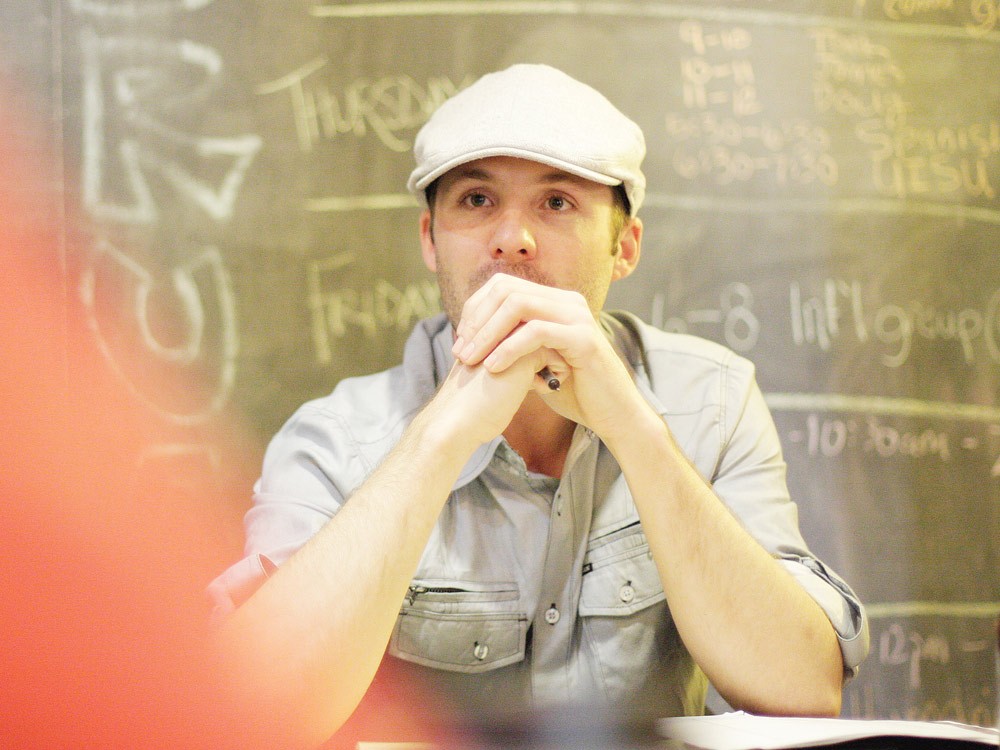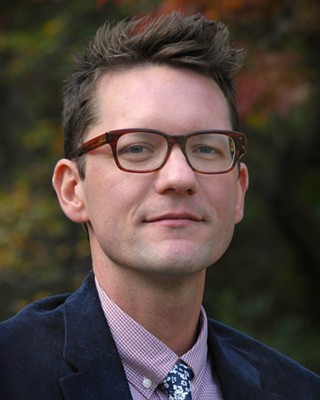It's Sunday in Moscow, Idaho, and all eyes turn to Tyler Palmer.
“I couldn’t be happier,” he tells the group congregated before him. Palmer, 32, has a boyish quality to him, despite the day or two of stubble on his face. The sleeves of his military-style shirt are rolled up.
Every Sunday, Palmer and the people here meet to talk about their beliefs. Unlike the vast majority of Americans, what binds them together isn’t a shared faith, but rather a shared faithlessness.
They call themselves freethinkers, humanists, skeptics and secularists — all euphemisms for what has become a bad word in America. They’re atheists.
Palmer wasn’t always this way. At 25, he was still a good Christian. Just north of Salt Lake City, Utah, his was a churchly family — his grandfather was a Mormon stake president, and his father a bishop. Like many Mormon children, he was baptized at 8 and later spent two years as a missionary, in Mexico.
Cracks in the walls of his religious life would occasionally appear — like the discomfort he felt “pushing a dogma” on Mexicans. Or when he discovered his “heathen” neighbor had a “real authenticity I wasn’t used to.” Cracks formed, but he could usually “putty them back up.”
But after he had kids of his own, the walls crumbled. At the time, he was teaching other Mormon children the way of the church in the months leading up to their baptisms.
“I felt horrible teaching those kids,” he says. “They didn’t know what making a commitment to the Lord Jesus Christ meant. They didn’t give a shit about that. They knew that grandma was going to give them $50, and they knew they were going to get a new dress, and they were excited about that. It was a social rite of passage.”
So he left — the church, his parents, Utah. And God.
It’s a path followed by more and more Americans lately, and they’re beginning to do it together — even in “Utah North,” as Palmer calls Idaho. Thanks to the Internet, meetups in coffee shops and bars, and a better-organized coalition of the faithless, America’s atheists are carving out a space for themselves in the national landscape.
In the last two decades, the number of Americans who reject religion has more than doubled, while the proportion of American Christians has actually dropped by 10 percent. A parade of best-selling books on atheism — by Christopher Hitchens and Richard Dawkins, among others — has not only helped nonbelievers find solace but also shown them that theirs is a cause shared by many others.
But not by everyone. Christians still represent 75 percent of the American public. And national politicians, especially those in the race to become the Republican Party’s presidential nominee, battle over faith and the role of God in government. Rick Santorum recently accused President Obama of having a “phony theology.” Newt Gingrich, another GOP candidate, insisted that the country’s founders intended America to be a Christian nation. And Republican frontrunner Mitt Romney continues to fight a persistent belief, shared by many Americans, that Mormonism isn’t a valid form of Christianity.
For Palmer, it’s all nonsense.
Since moving to Moscow two and a half years ago to work in the city’s public works department, Palmer has become a leader in the local atheist movement. As the president of Humanists of the Palouse, he was instrumental in the recent Darwin on the Palouse event, which brought nationally renowned atheists to speak in Pullman. During the group’s meeting on Sunday, they’ve gathered to discuss the event, its successes and how to improve it next year.
“We consider ourselves atheists,” he says of him and his wife, Meg. “We had been told our whole lives that [religion] was supposed to make us happy, and yet we kept having to put things in boxes and ignore the way we think and feel about things. That really couldn’t last long.”
The Darwin Effect
Modern atheism evolved out of the Enlightenment, when the tenets of science were, for the first time, seen as the best means to improve society.
This was a troubling development for religion. Not only was it difficult to prove God’s existence through reason rather than faith, but also the religious tolerance that sprang from the Enlightenment allowed atheistic thinkers to enter the public dialogue.
After Paul Baron d’Holbach disavowed God in his 1770 book System of Nature, other thinkers found it less difficult to do so. Since then, the occasional author, artist, celebrity or scientist has become the face of the faithless — Friedrich Nietzsche, Kurt Vonnegut, Jr., Ayaan Hirsi Ali.
But perhaps the most significant figure for atheists remains Charles Darwin, who didn’t call himself an atheist but rather an agnostic, someone who believes God’s existence is unknowable. (“Science has nothing to do with Christ,” he said, perhaps to appease his pious wife.)
Darwin’s theory of evolution is the topic most closely tied to atheist thought, by both its opponents and adherents.
Robert Prusch, a biology professor at Gonzaga University, teaches a course looking into “the conflict between religion and evolution, which some people take as atheistic.”
This conflict, Prusch says, stems from an overly strict view of God and the Bible.
“It’s really confined to this country,” he says of the conflict. “Mainly, fundamentalists see the world in right or wrong, black and white, no shades of gray.”
Such strident views of religion — and science — hide the fact that the two are compatible, Prusch says. The ancient Hebrews had “no idea about biology and astronomy” when they penned the Bible, but were instead trying to grapple with difficult questions: Why are we in this condition? Where did we come from? Why are we suffering?
Others, like prominent scientist Jerry Coyne, say modern science has eliminated the need for religion.
“Science and faith are fundamentally incompatible, and for precisely the same reason that irrationality and rationality are incompatible,” Coyne wrote in a 2010 USA Today opinion article. “Their ways of understanding the universe are irreconcilable.”
In the article, Coyne points to a 2006 study published in Science called, “Public Acceptance of Evolution.” That piece argues that the less religious a country is, the more likely its people will believe in evolution. America ranked second to last, among surveyed nations, for its belief in evolution. This is “largely because of widespread fundamentalism and the politicization of science in the United States,” the study says.
“So religious claims retreat into the ever-shrinking gaps not yet filled by science,” Coyne writes. “And, although to be an atheist in America is still to be an outcast, America’s fastest-growing brand of belief is non-belief.”
A Bad Name
Inside Moscow’s One World Café, the sedate college town shows its bustle. The espresso grinder whirs in the background above the music, buzz of people talking and the clack-clack-clack of the barista making another shot.
Upstairs, the leaders of the Palouse Coalition of Reason sit at a table. The coalition came about in the last few months, when three separate groups banded together: Humanists of the Palouse, the Secular Cougs and Freethought Moscow.
During this particular meeting, the members discuss their Darwin on the Palouse 2012 event, held each February during the week of Darwin’s birthday.
As a chapter of the national United Coalition of Reason, the group was able to bring in such well-regarded speakers as Daniel Dennett, PZ Myers, Fred Edwords and Jen McCreight.
“We were all going to be really happy with 300” people attending the first event, a Friday evening talk with Dennett and Myers, says Matt Williamson, the coalition’s coordinator. “There were 518.”
Not a bad showing, considering the topic was the evolution of reason and the lack of evidence supporting “intelligent design,” the Christian counter-theory to Darwin’s “natural selection.”
The next day — in which McCreight gave a slideshow describing her visit to a creationist museum — went over capacity, and the group had to scramble to get more chairs.
During Sunday’s debriefing, conversation turns to why the word “atheist” appears nowhere in any of their groups’ names, or in any of the literature for the Darwin celebration.
“We thought it was more inclusive to people that might not be atheist, or might not be able to label themselves as such yet,” says Jenae Reese of why WSU’s Atheist & Agnostic Student Group changed its name to the Secular Cougs, the group she advises as a faculty member. “They’ve been taught to hate atheism.”
“Right. And it’s such a bad word,” says Palmer, the lapsed Mormon who heads Humanists of the Palouse.
“So alienating,” Reese adds. The name change seems to have worked. Where just two years ago only a handful showed up to the weekly meetings, now 30 people do. Their email list numbers 200. (“Not everyone comes to the meetings,” adds Reese. “It feels too much like church.” She laughs.)
“Growing up a religious kid, I equated atheists with devil worship,” Palmer says. “It’s a word that has a very negative connotation to it.”
He brings up the shifting perceptions in America. “Religion is on the decline in our country,” he says. “The trends are in that direction.”
“Thank you, Internet,” says Craig Wheeler, president of the Secular Cougs.
The Politics of None
In his 2009 inaugural address, President Obama spoke of unity.
“For we know that our patchwork heritage is a strength, not a weakness,” he said. “We are a nation of Christians and Muslims, Jews and Hindus, and nonbelievers.”
He didn’t know how right he was. Two months later, Connecticut’s Trinity College released a major study called the American Religious Identification Survey. It showed that the people who claimed “no religion” were the only demographic to grow in every state in the last two decades — even in South Carolina, where the proportions of nonbelievers tripled.
Between 1990 and 2008, American “nones,” as the study called them, more than doubled their numbers nationwide, from 14 million to 34 million. They now represent 15 percent of the population. Though the typical “none” is a white male, the fastest-growing demographics in this group are Hispanics and Irish Americans, historically two deeply religious communities.
As the study points out, these folks aren’t all atheists. They’re the “irreligious, the unreligious, the anti-religious, and the anti-clerical.” They’re best described as “skeptics,” the study says, and call themselves agnostics and deists, a term many of the country’s founding fathers used to describe their belief in the divine.
But don’t say that on the campaign trail.
As more and more people are checking “no religion” on questionnaires, the Republican Party has aligned itself closer to the religious right. It was in 1992 when Pat Buchanan famously gave a keynote address at the Republican National Convention in which he described “a religious war going on in our country for the soul of America.” Since then, nonbelievers have flocked to the Democratic Party.
Nevertheless, Republican presidential candidates continue to seek traction on religious grounds.
Rick Santorum, the former senator from Pennsylvania, recently accused Obama of having “a phony theology” and said that the Democrats have “secular values that are antithetical to the basic principles of our country.” He later backtracked, saying he was talking about Obama’s environmentalism.
Newt Gingrich, the former speaker of the House, has warned of a future where America is a “secular atheist country, potentially one dominated by radical Islamists and with no understanding of what it once meant to be an American.” How a fundamentalist religious group would lead a godless country, Gingrich did not explain.
As a self-described historian, Gingrich has taken it even further, saying that George Washington and Thomas Jefferson envisioned America as a Christian nation, an idea that many historians reject. Washington acknowledged and saluted 22 different religions as president. Jefferson described himself as a deist and was strictly against organized religion, even as he valued the moral teachings of Christ. He also coined the term “wall of separation between church and state.”
God is Happiness
Father Michael Cook says that some atheists and people like Rick Santorum believe in the same God.
“People like that have a stereotype of God,” says Cook, a professor of religious studies at Gonzaga. “God is a punishing god, an angry god, a god who sends you to hell if you don’t obey the commandments. It’s more a fundamentalist view of God.”
But unlike the God-fearing senator, the “militant atheists,” as Cook calls them, get their “image of God from a religion that they reject.”
Cook doesn’t blame them, though he does take Santorum to task for claiming that Obama valued the Earth over man, saying that Santorum’s interpretation is sexist and denies ecological truths.
But he suggests “practical atheists” might not fully understand the meaning of God.
“God has no relevance in their lives,” he says. These people don’t see the work of God in their everyday lives, like the devout do. And they see no material evidence of God’s existence.
“God isn’t that type of experience,” Cook continues. “You need evidence, just not that type of evidence. There are other forms of truth [than what science proves to us]. There’s a different kind of knowing when it comes to relationships, than there is with an object before you.” What he means is that science is good at weighing and measuring physical things and phenomena. But calculating the love you feel for your mother, for example, is beyond its realm.
For Cook, God is necessary to true happiness and a just world.
“God works through us,” Cook says. “The so-called ‘proof’ of Christianity is the fact that we love one another and seek social justice.”
He points to activism as a realm where God and Christ are necessary.
“People who are concerned with social issues can work with one other, regardless if they’re atheists or Christians,” he says. “But if you’re purely an activist, you burn out. A relationship with God gives you contemplative depth: Whether I succeed or not in this particular enterprise, there’s a confidence” that in the end, thanks to God, justice will be served.
“Every human person is looking for meaning in some sense,” Cook says. “You remember the Snoopy cartoon where he’s wondering about the meaning of life? Charlie Brown brings his supper and Snoopy says, ‘Ah, meaning.’ Without meaning, there’s unhappiness. From the Christian perspective, we will ultimately be one with God, which is happiness.”
All Are Welcome
The Palouse Coalition of Reason is still camped out in a room in One World Café. A blackboard on the wall has the markings of the room’s previous inhabitants: a grid, equations, other signs of math.
Palmer, the former Mormon, leads the conversation, but the coalition’s leaders are all here.
There’s Craig Wheeler, president of the Secular Cougs, who grew up in Puyallup, Wash., as an Episcopalian. He was an acolyte, an altar boy. At 14, he had doubts and his church’s leaders told him to read the Bible.
“That was their first mistake. I read the whole Bible,” he says. A couple of years later, he saw Richard Dawkins on The Daily Show with Jon Stewart and that was it. He was de-converted.
And there’s Mike Steffens, who leads the University of Idaho’s student group, Freethought Moscow. His Catholic family in Ohio doesn’t know he’s an avowed atheist. And that’s probably good, considering his grandmother recently told him that all atheists should be rounded up and deported to Iraq.
And there’s Jenae Reese, the faculty advisor for the Secular Cougs, who grew up in a fundamentalist Baptist family in Moses Lake, Wash., going to church four times a week.
“The Bible was literally true in every aspect,” says Reese, 33, of how she was raised to think. When she was 21, one of her closest friends came out of the closet and announced to the world she was gay. The church condemned her. Reese did not.
Within a year, she left the church. It took another three years before she lost her belief in God.
“The transition from being a fundamentalist Christian to ‘I’m an atheist,’ it couldn’t have happened quickly. It was so frightening to even contemplate the idea that hell might not exist. I remember having nightmares about it,” she says. “It’s hard to escape from those ideas. It takes a long time.”
As the congregation in the coffee shop shows, the tent of atheism can fit many — Episcopalian, Catholic, Baptist, Mormon. As the country’s other religions contract, the well of atheism fills.
“When you start to look at your own religion in the same light you always looked at other religions — you know, I always looked at Zeus as silly, or Rah, or Allah or all the other ones — once you apply that same logic and reason to your own God, there’s no going back,” says Palmer. “I’m not anti-anything. I’m pro-reason, pro-logic, pro-science.”


























